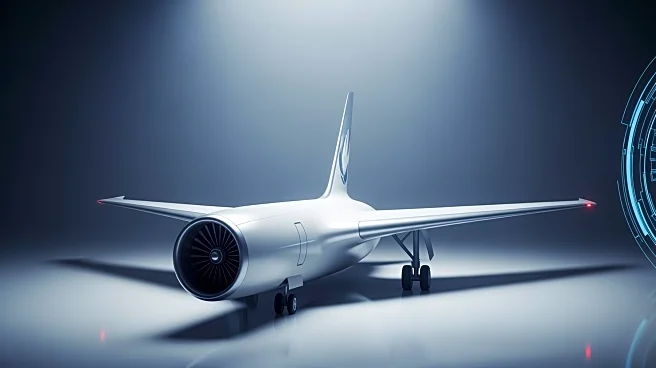What's Happening?
Boeing Commercial Airplanes has commenced the assembly of wings for the Boeing 777-8 Freighter at its Everett, Washington facility. This development marks a significant milestone in the production of what
is anticipated to be the world's largest and most capable twin-engine cargo aircraft. The 777-8 Freighter, part of Boeing's next-generation 777X family, is designed to set new standards in air cargo transport efficiency and performance. With a structural payload capacity exceeding 118 tonnes and a range of over 4,400 nautical miles, the aircraft aims to revolutionize global freight operations by offering long-haul reach with reduced emissions and improved economic efficiency. The wing assembly process, a complex stage of aircraft production, involves precise coordination among engineers and mechanics, highlighting Boeing's expertise in precision-driven manufacturing.
Why It's Important?
The introduction of the Boeing 777-8 Freighter is poised to significantly impact the global air cargo industry. As e-commerce and express delivery services continue to expand, the demand for efficient and capable cargo aircraft is increasing. Boeing projects a 70% rise in worldwide air freight traffic over the next two decades, driven by these sectors. The 777-8 Freighter's advanced aerodynamics and composite structures, initially introduced in the 777X passenger jets, are expected to help airlines reduce fuel consumption and emissions while maximizing payload revenue. This positions the aircraft as a critical asset for major cargo hubs and long-haul networks, enhancing operational efficiency and sustainability in the air freight market.
What's Next?
As Boeing progresses with the 777-8 Freighter's development, the company is likely to focus on completing the assembly and testing phases to ensure the aircraft meets its performance and efficiency targets. The successful deployment of this freighter could lead to increased orders from global cargo operators seeking to modernize their fleets with more sustainable and cost-effective options. Additionally, Boeing's continued innovation in cargo aircraft design may prompt competitors to enhance their offerings, potentially leading to advancements across the industry. Stakeholders, including airlines and logistics companies, will be closely monitoring the aircraft's performance and operational benefits as it enters service.
Beyond the Headlines
The 777-8 Freighter's development underscores a broader trend towards sustainability and efficiency in aviation. As environmental concerns and regulatory pressures mount, the aerospace industry is increasingly prioritizing innovations that reduce carbon footprints. Boeing's focus on advanced materials and aerodynamic improvements reflects a commitment to addressing these challenges. The aircraft's introduction during Manufacturing Month also highlights the critical role of skilled labor and technological expertise in driving industry advancements. This development may inspire further investment in workforce training and development to support the evolving demands of modern aircraft manufacturing.









